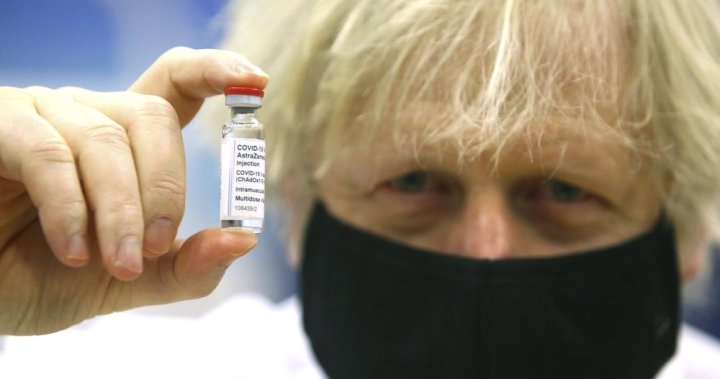England is moving forward with its reopening plans, despite a surge in COVID-19 cases in the last few weeks. The country will formally drop nearly all restrictions, including mandatory masks in public places and restrictions on public events, by July 19, U.K. prime minister Boris Johnson announced on Monday.
The reasoning, according to health secretary Sajid Javid, is that while cases are rising, two doses of vaccine provide effective protection against hospitalization — meaning that the health care system is unlikely to be overwhelmed, even if case numbers increase. And case numbers have been increasing, with the U.K. reporting over 30,000 daily cases recently.
Read more:
Britain to lift all remaining COVID-19 restrictions by July 19, health chief says
Experts contacted by Global News are divided, though, as to what lessons Canada should take from the U.K.’s policy.
“It’s a tragic mistake,” said Dr. Peter Juni, a professor of medicine and epidemiology at the University of Toronto and scientific director of Ontario’s COVID-19 Science Advisory Table. He believes that the U.K. will become a “cautionary tale” as the link between case numbers and hospitalizations still very much exists.
“It is absolutely true that relative to the number of cases, the number of people admitted to the ICU and the number of people admitted to hospitals is lower,” he said.
“But the cases are on the rise in an exponential fashion and so are ICU and hospital occupancy. If the U.K. continues on the trajectory they currently are and if they open up more, it will actually get worse.”
It’s “a matter of time” before ICUs in the U.K. are full again, Juni says, and he suspects this will happen by mid-September if the country continues on its current course.

Dr. Matthew Miller, an associate professor at the Michael G. DeGroote Institute for Infectious Disease Research at McMaster University, disagrees.
“The fact that that we’re seeing this pretty considerable spike in cases in the U.K. that has really, for the first time in the pandemic, become disconnected from numbers of deaths is a great sign,” he said.
“It should be really encouraging evidence that supports how well vaccines are working. Nevertheless, we should also look to the U.K. and understand that this massive spike in cases is largely driven by unvaccinated fragments of the population. And it should warn us how easily this virus can continue to spread, especially to those who haven’t yet received the vaccine or who are not fully vaccinated.”
Read more:
U.K. is seeing a 4th wave of COVID-19. But this does not mean Canada will, experts say
Ashleigh Tuite, an epidemiologist at the Dalla Lana School of Public Health at the University of Toronto, believes that we are seeing a disconnect between case counts and severe outcomes in the U.K. — but not a strong enough one to justify cutting all restrictions.
“You’re seeing the effect of the vaccines in the sense that that link between cases and hospitalizations and severe illness is weakened, but it’s not broken,” she said.
“You’ve seen this exponential increase in cases and then a few weeks later they started to see this exponential increase in people being admitted to hospital. And even if the risk of being hospitalized is lower if you’re vaccinated, if you have enough people getting infected, you’re still going to eventually overwhelm your health care system.”
Read more:
U.K. records highest daily COVID-19 cases in months amid Delta variant surge
While much of the U.K. was vaccinated with the AstraZeneca vaccine, Tuite doesn’t think that will have had much of an impact on hospitalization numbers versus mRNA vaccines — as both have been shown to vastly reduce the chances of severe illness, she said.
Miller thinks that an approach that relies on ICU numbers rather than case counts for removing or re-imposing restrictions is “prudent,” but in order for it to work, we need to vaccinate as many people as possible.
Even if we were to decide that not overwhelming ICUs was the sole goal of our COVID-19 restrictions, Tuite warned there might still be consequences for vulnerable populations.
“Even if societally we’re not in a situation where we’re worried about our health care system collapsing, if we’re having thousands of infections happening in children and we start seeing kids end up in hospital or children dying, then even if those numbers aren’t large enough to overwhelm our health care system, are we OK with even a handful of additional deaths in children?” she asked.

Juni doesn’t think Canada should follow the U.K.’s lead when it comes to reopening, but instead cautiously remove restrictions and carefully monitor the outcomes.
“[Ontario is] probably the only region, western region, in the world that has a really high percentage of the Delta variant and still is OK and it’s not, again, in exponential growth.”
“If we have the next step of our re-opening happening now, we will only start to see roughly three weeks after that what starts to happen with case counts. And then we can continue to calibrate our measures carefully so that we continue to successfully harvest the fruits of our vaccine rollout.”
“It’s so complicated,” said Tuite. Because it’s hard to guess the right answer, you have to prepare for every possibility, she said.
“I think at this point, it’s a lot harder to backtrack than it is to take things slowly.”
— with files from Reuters and the Associated Press
View link »
© 2021 Global News, a division of Corus Entertainment Inc.














































